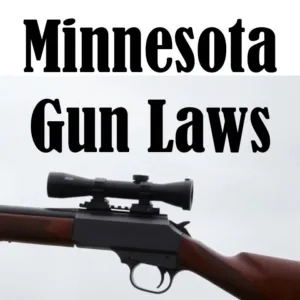Minnesota has a mix of regulations regarding the purchase, possession, and carrying of firearms, including permits for handguns, background checks, and specific rules for open and concealed carry. This comprehensive guide covers Minnesota’s gun laws, including requirements for purchasing, concealed carry, open carry, restricted areas, and self-defense laws.
Minnesota Gun Laws Overview

Purchasing Firearms in Minnesota
Purchasing a firearm in Minnesota comes with specific requirements, especially for handguns and certain types of firearms. Minnesota’s laws distinguish between long guns and handguns, requiring permits only for handgun purchases.
Key Requirements:
- Permit to Purchase: Required for handguns and some semi-automatic military-style firearms but not for rifles or shotguns.
- Background Check: Mandatory background checks are required for all firearms purchases from licensed dealers, including long guns.
- Waiting Period: A 7-day waiting period is required for handguns and certain other firearms.
- Minimum Age: Federal law sets the minimum age at 18 for long guns and 21 for handguns.
Permit to Purchase (PTP) and Transfer Requirements
To purchase a handgun or certain semi-automatic firearms in Minnesota, residents must have either a Permit to Purchase (PTP) or a Permit to Carry (PTC), which serves as an alternative. The permit is valid for one year and is obtained through local law enforcement.
Steps to Obtain a Permit to Purchase:
- Eligibility Requirements: Must meet age requirements, pass a background check, and fulfill residency requirements.
- Application Process: Applications are submitted to local police departments, and the department has up to seven days to conduct the necessary checks.
- Renewal: The Permit to Purchase is valid for one year and must be renewed annually if needed.
Open Carry in Minnesota
Minnesota allows open carry but requires a Permit to Carry (PTC) for residents to carry a handgun openly.
Key Points on Open Carry:
- Permit Required: Open carry of a handgun is permitted only with a valid Permit to Carry (PTC).
- Restricted Areas: Open carry is prohibited in certain locations, such as schools, government buildings, and private property where firearms are restricted.
- Vehicle Carry: Open carry in a vehicle also requires a PTC.
Concealed Carry in Minnesota
Minnesota is a “shall-issue” state for concealed carry, meaning that local law enforcement is required to issue a permit if the applicant meets the legal requirements. A PTC allows the holder to carry a handgun both openly and concealed.
How to Obtain a Permit to Carry (PTC) for Concealed Carry:
- Eligibility Requirements: Applicants must be at least 21 years old and meet background check requirements.
- Training: Completion of an approved firearms training course within one year before applying is mandatory.
- Application Process: Applicants must submit their PTC application to the sheriff in their county of residence, including proof of training and payment of fees.
- Renewal: PTCs are valid for five years and must be renewed before expiration.
Reciprocity with Other States
Minnesota recognizes concealed carry permits from some states, provided those states have similar standards. However, Minnesota does not have reciprocity with all states, so permit holders should check current reciprocity agreements before traveling.
Restricted Locations for Carrying Firearms in Minnesota
Minnesota enforces restrictions on where firearms may be carried, even with a Permit to Carry.
- Schools and University Campuses: Firearms are prohibited on K-12 school grounds and on public college campuses.
- Government Buildings: Certain government facilities, like courthouses and law enforcement agencies, restrict firearms.
- Private Property: Property owners may restrict firearms on their premises, and these restrictions must be observed.
- Places of Worship: Firearms are restricted in places of worship unless otherwise permitted by the facility.
Assault Weapons and Magazine Capacity in Minnesota
Minnesota does not have specific state restrictions on assault weapons or magazine capacities beyond federal regulations, allowing residents to possess a variety of firearms and magazine types.
Self-Defense Laws in Minnesota: Duty to Retreat and Castle Doctrine
Minnesota enforces a Duty to Retreat policy in public spaces, which means individuals must retreat from a confrontation if it is safe to do so before using force in self-defense. However, Minnesota has a limited Castle Doctrine for self-defense within one’s home.
Duty to Retreat
In public, Minnesota requires individuals to attempt to retreat if possible before using deadly force, except in situations where retreating is impossible and they are under imminent threat of serious harm.
Castle Doctrine
Minnesota’s Castle Doctrine applies within one’s home, allowing residents to use force in self-defense against intruders without the duty to retreat if they feel threatened.
Firearms Prohibited Persons in Minnesota
Minnesota restricts firearm possession for individuals who meet certain prohibitive criteria.
- Felony Convictions: Individuals with felony convictions are generally prohibited from possessing firearms.
- Domestic Violence Convictions: Those with convictions for domestic violence or active restraining orders related to domestic violence are restricted from firearm ownership.
- Mental Health Restrictions: Individuals involuntarily committed for mental health treatment or found incompetent to stand trial may be prohibited from firearm possession.
- Substance Abuse: Persons with certain drug-related convictions may be restricted from owning firearms.
Penalties for Violating Gun Laws in Minnesota
Violating Minnesota’s firearm laws can result in penalties, including fines, imprisonment, and permanent loss of firearm rights.
- Unlawful Possession: Possessing a firearm without a Permit to Purchase or Permit to Carry, when required, can lead to significant legal consequences.
- Carrying in Restricted Areas: Bringing a firearm into restricted locations, such as schools or government buildings, may result in fines or imprisonment.
- Illegal Firearm Sales: Selling firearms without proper background checks or permits can result in criminal charges.
Conclusion: Understanding Minnesota’s Gun Laws
Minnesota’s firearm laws require residents to obtain specific permits for certain firearm purchases and to carry firearms legally. Those interested in carrying firearms in Minnesota should familiarize themselves with purchase, open carry, and concealed carry requirements and restrictions to ensure compliance.
FAQs About Gun Laws in Minnesota
1. Do I need a permit to buy a gun in Minnesota?
Yes, a Permit to Purchase is required for handguns and certain semi-automatic firearms.
2. Is open carry allowed without a permit in Minnesota?
No, a Permit to Carry is required to open carry a handgun.
3. Does Minnesota restrict magazine capacity?
No, Minnesota does not impose magazine capacity limits.
4. Does Minnesota recognize out-of-state concealed carry permits?
Yes, Minnesota recognizes some out-of-state permits, but not all. Reciprocity agreements should be checked before travel.
5. What self-defense laws apply in Minnesota?
Minnesota has a Duty to Retreat in public spaces but allows self-defense within one’s home under the Castle Doctrine.
